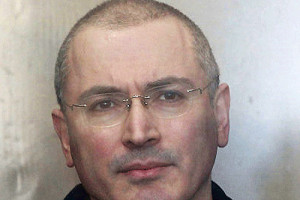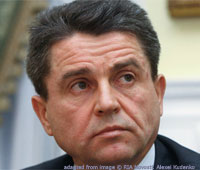And now … a murder rap for Khodorkovsky?

(Business New Europe – bne.eu – MOSCOW BLOG: Ben Aris in Moscow – July 2, 2015)
On June 30, the spokesman for Russia’s Investigative Committee, Vladimir Markin, made a shocking allegation. He accused the former head of Yukos oil major Mikhail Khodorkovsky of ordering the 1998 murder of Vladimir Petukhov, the mayor of Nefteyugansk, and several other crimes.

Vladimir Markin file photo
The announcement was shocking, as throughout the scandal that followed Khodorkovsky’s arrest and trial in 2003, ending with the re-nationalisation of his company, which now makes up the core of state-owned oil giant Rosneft, observers were expecting exactly that charge to come up every day. It is the Kremlin’s trump card in its perennial battle with Khodorkovsky, because unlike the spurious tax evasion and fraud charges he was eventually jailed for, this could credibly be laid at his door. Indeed, former KGB officer and Yukos head of security Alexei Pichugin was convicted of precisely this murder in 2007, as well as killing and assaulting several other people who stood in Khodorkovsky’s way.
There are a few possible explanations why this Kremlin ace is being played now, including that after the toppled tycoon found his feet in the free world again, his family’s stance against his former captors is starting to become more than an irritant. But there are other reasons that require a recap on this mucky and bloodstained chapter in modern Russia’s history.
Surprise!
At the end of the 1990s, Khodorkovsky was locked in conflict with the popular Petukhov for control of the local oil producer Yuganskneftegaz, one of the three oil enterprises that eventually formed the heart of Yukos (and now Rosneft). Petukhov successfully resisted Yukos’ attempts to privatise the facility until on June 26, 1998, he was brutally mown down by machine gun fire while walking home after work and left to die in a ditch.
The investigation concluded that the killing was an assassination, coordinated by former Yukos oil company vice-president Leonid Nevzlin, who has lived in self-imposed exile in Israel since 2003, and organised on the ground by Pichugin.
The killing happened to fall on the birthday of Khodorkovsky, who was informed of Petukhov’s death at a party he was holding at the Yukos club house in central Moscow. According to several bne IntelliNews sources who were present at the party, Khodorkovsky was furious, presumably realising that he could be implicated in the killing. He was right.
This is not the first time the accusation of Khodorkovsky’s involvement has come up. Petukhov’s widow, Farida Islamova, also accused Khodorkovsky of complicity in her husband’s death in a book published in Prague last June. “There is a man whose name is Khodorkovsky who is telling the whole world that he’s not guilty of the murder of Vladimir Petukhov, but the truth is the opposite,” Islamova said during the book’s English-version launch in Prague. She argues in the book that Khodorkovsky was aware that “an organized gang of killers was operating under the ‘roof’ of his Yukos company”.
Before that, Steve Allen, a prominent oil analyst who worked at Renaissance Capital during Yukos’ heyday and is now co-head of investor relations at a leading commercial Russian oil company, sent a letter to the Wall Street Journal just before the13th anniversary of Petukhov’s death asking: “Is Khodorkovsky the Al Capone of Russia?”
“Regarding the editorial on Russia in today’s Journal by Anne Jolis (‘Khodorkovsky heads back to Siberia’ June 15th, 2011), I could not help but notice the significance of the date,” Allen wrote. “Exactly 13 years ago today, on June 15th, 1998, the mayor of the Siberian oil city of Nefteyugansk sent a letter to Boris Yeltsin and nine of the top officials in the Russian government. The mayor, Vladimir Petukhov, used the letter to assail the ‘murderous policies’ carried out by Khodorkovsky’s YUKOS group in his city, and demanded a tax and criminal investigation into that group and various related (and named) shell companies. In his closing, instead of using the typical ‘with respect’, he uses the less typical phrase ‘with hope!’ Eleven days later, on Khodorkovsky’s 35th birthday, Petukhov was shot to death on the street outside his office.”
Petukhov’s letter goes into a great deal of detail making very specific allegations of scams, fraud and non-payment of taxes, naming names and calling for the sacking and/or arrest of several key local officials that the mayor claimed were on the Yukos payroll.
Timing is everything
That leaves the biggest question of: why is the Investigative Committee now making the accusation? If it is so easy to bring a charge of murder against Khodorkovsky that could be made to stick, given the malleability of the Russian legal system, why wasn’t it brought in 2003 and Khodorkovsky put away for life?
There is no easy answer to this question. One likely answer is that the Kremlin didn’t want to play all its cards at once. It was always going to win the showdown with Yukos and convict Khodorkovsky on tax evasion charges, so there was no need to charge him with murder. Now that Khodorkovsky is living in Switzerland a free man and events connected with him and his former company have taken a decidedly bad turn for Russia, it’s time to play that trump card.
The Kremlin is clearly unhappy with Khodorkovsky’s political activities, despite the fact that he has maintained a pretty low profile since being released. The same is not true of his son Pavel Khodorkovsky, who has financed the Institute of Modern Russia, a political lobbying organisation that is actively denigrating the Kremlin and runs things like The Interpreter, a website dedicated to rubbishing the Kremlin.
Then there has been the continuing international legal actions taken by former Yukos shareholders against the Russian state. Their most significant victory came last year when the Permanent Court of Arbitration in The Hague awarded them $50bn, which the Russian state has refused to pay. This has led to the investors seeking court orders to freeze, and ultimately seize, Russian state assets all over the world, which exploded into the headlines on June 18 when court bailiffs in Belgium and France began seizing Russian state property and freezing bank accounts, including the Paris offices of the Russia Today television channel. The Kremlin is said to be seething.
Finally, there is simply the reason that Alexander Bastrykin, head of the Investigative Committee, has a personal grudge against Khodorkovsky. The committee has been running a pretty much continuous investigation into Khodorkovsky since it was set up – even while he was still in jail.
It’s who you know
Liberal economist and the intellectual powerhouse behind Russia’s most liberal reforms in the last decade, Professor Sergei Guriev, fled Russia on April 30, 2013 after he was called in for questioning by the Investigative Committee’s investigators in connection with his contacts with Khodorkovsky a few days earlier. (Khodorkovsky provided some financing for Guriev’s New Economic School.)
“They said I was being questioned in an investigation, but they made it sound more like I was a suspect,” Guriev told First Deputy Prime Minister Igor Shuvalov the weekend before he fled while asking for protection, according to bne IntelliNews sources familiar with the meeting. Shuvalov told Guriev there was nothing he could do and recommended he keep a low profile for a few months. Guriev decided he didn’t want to live in a country where his freedom was in jeopardy for simply knowing the wrong people and chose political exile instead.
Meanwhile, Russia seems not to doubt its ‘long arm of the law’ in following up the new charges with a questioning of the suspect. Khodorkovsky’s “absence from Russian territory would not be an insurmountable obstacle”, Investigative Committee spokesman Markin said in his June 30 statement.
[featured images are file photos]
